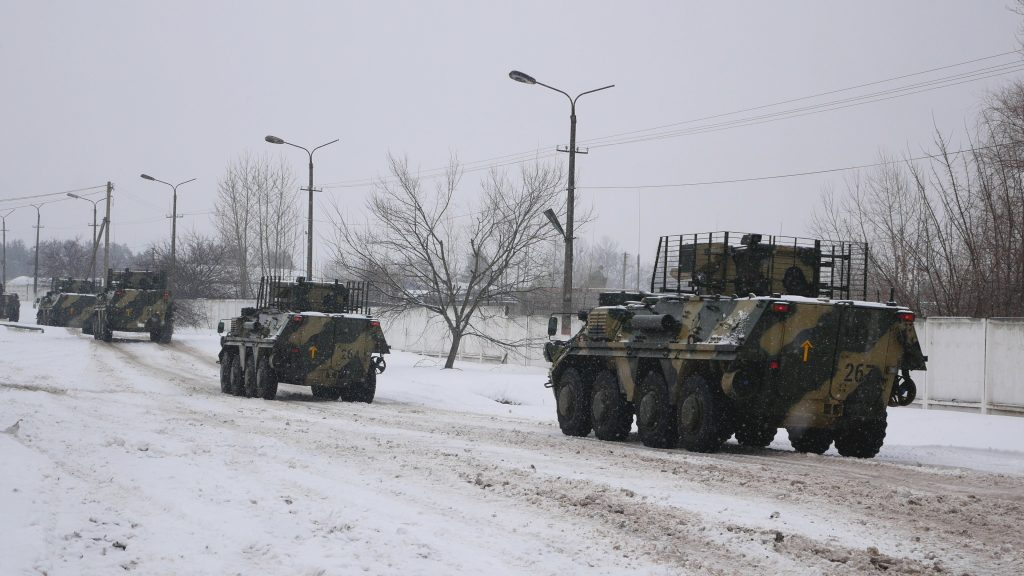Cape May City Council opened its public meeting March 1 with a prayer for Ukraine. A deeply felt humanitarian concern for a people caught in a war they did not expect or want is wholly understandable. Yet, there are other reasons why what happens in Ukraine matters to us safely half a world away.
A new ground war in Europe was a vision hardly imaginable after the collapse of the Soviet Union in 1991. The reaction in much of the western world then was that democracy had won out against communism, that the Cold War had ended with an American victory. One pundit called it the End of History, arguing that it resulted in the “universalization of Western liberal democracy as the final form of human government.”
Nothing is ever that simple. When the Berlin Wall was demolished and the Union of Soviet Socialist Republics disintegrated, it was all too easy to see Russia as a defeated power, but one that retained a nuclear arsenal. Through both Republican and Democratic administrations, we engaged in a foreign policy that continuously extended rather than retracted American commitments. The voters, who seldom pay close attention to foreign policy, largely remained oblivious to those actions.
Among those extensions of our commitments was NATO. In 1949, NATO was a defense alliance of 12 Western nations bound together by an Article Five pledge that an attack on one was an attack on all. During the Cold War, NATO expanded to include four more countries, including West Germany.
With the fall of the USSR, with the Russian threat diminished, NATO continued to expand to the east, adding 14 new members to the then 16-member coalition. As NATO expanded, so, too, did the Article Five pledge given to countries like Albania, Croatia, Latvia, Estonia, and Slovenia, to name a few.
There was little public debate over this expansion of our commitments. It was the product of actions by both major political parties. Now, we find ourselves confronting a war in Europe in a country that was preparing for NATO membership. Ukraine has borders with four NATO nations.
We watch this war unfold knowing that wars are wholly unpredictable. In August 1914, Kaiser Wilhelm II famously predicted that departing German troops would be home before the autumn leaves fell. No matter how quickly this current war ends, it will leave an indelible mark on the psyche of those who formulate foreign policy.
Aside from the dangers of the conflict itself, there are also reasons why this war in Ukraine is worrisome for us. Prior to the onset of hostilities, we were already experiencing the worst inflation in 40 years. Early evidence is that the war in Ukraine is not without consequence for that inflation. If the war does not end quickly, the invasion and the sanctions applied to combat it will continue to inject uncertainty in an already fragile world economy.
To list just some of the scenarios is sufficient. Transportation costs are expected to rise steeply. Warnings are that ocean rates for a container could double or triple from current levels. The American Automobile Association predicts another hike in the national average for a gallon of gas, already 35% higher than a year prior and with summer demand approaching. The immediate impact following the invasion was a rise in oil prices to now over $110 a barrel. Bloomberg reports a sharp rise in fertilizer prices due to potential interruption of Russian exports. In our interconnected world, the list could go on.
Luckily for the American economy, we are dealing with a country in Russia that has only 1.7% of the world’s total output. Unluckily for Europe, the West finds it necessary to apply sanctions against a country on whom Europe depends for a major share of its energy imports.
Regardless of how one views the proper role of the U.S. with respect to the Ukrainian war, the real lesson here is the need to raise public awareness of the impact of foreign policy decisions and commitments before circumstances require us to act on those commitments. As we are observing, the Russian people, in obvious measure, do not support Vladimir Putin; however, the Ukrainian people are strongly behind Volodymyr Zielinski. Ultimately, public support is decisive.
If we agree as a nation to make commitments that might lead to wars, those commitments must be made in the public sphere with adequate public involvement. For the most part, that was not true with respect to the advance of NATO almost to the borders of Russia.
In Ukraine, we have stopped short of military intervention, yet the Russian fear of NATO, with its Article Five, eventually extending itself into Ukraine played a major role in Putin’s thinking. As recently as 2008, NATO promised Ukraine it would eventually have a place in the alliance.
The commitment to the military defense of other countries requires public support, which can only be truly granted by an informed public. Wars cost in lives and disruption of peaceful economies. Those costs must be weighed, understood, and accepted. We must prepare to meet those commitments. To some, these commitments must be made to secure a peaceful world. To others, they endanger world peace and run the risk of involving us in wars we cannot win.
Switch gears, if you will, and consider Asia. In 1980, the U.S. ended the Sino-American Mutual Defense Treaty with Taiwan. It was replaced with the Taiwan Relations Act, which stops short of the earlier treaty’s promise of military assistance to Taiwan in case of invasion. Yet, many in the American foreign policy establishment believe we have an obligation to defend Taiwan.
Is Taiwan an Asian version of Ukraine? If so, we would be dealing with a very different adversary,one on whom economic sanctions could boomerang badly.
The war in Ukraine is a humanitarian disaster. Over 1.5 million immigrants have already fled.
The situation in Europe presents a dangerous moment because wars always have unintended consequences. The commitments to get into them cannot also be unintended. This is a potential wakeup call that we have a responsibility as citizens to understand and opine on foreign policy formulation and commitments.
The world does not begin and end with our borders and cannot be made to do so. The question is not our participation in the wider world, but the nature of that participation. It is an issue to be settled openly and before belligerents restrict our options.
The war in Ukraine, for all its horrors, needs to trigger the necessary debate here at home before we are challenged by events elsewhere that will be much harder to contain.
—–
From the Bible: Jesus said, “I give you a new commandment: love one another. Just as I have loved you, you must also love one another” John 13:34








